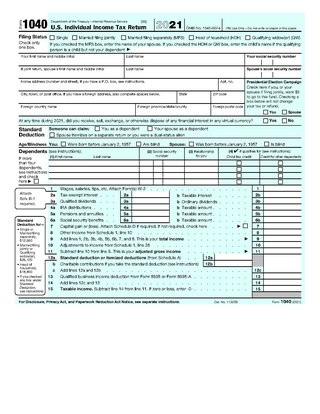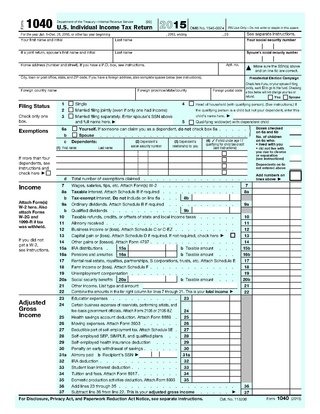
Form 1040, officially, the U.S. Individual Income Tax Return, is an IRS tax form used for personal federal income tax returns filed by United States residents. The form calculates the total taxable income of the taxpayer and determines how much is to be paid to or refunded by the government.
The Dormant Commerce Clause, or Negative Commerce Clause, in American constitutional law, is a legal doctrine that courts in the United States have inferred from the Commerce Clause in Article I of the US Constitution. The primary focus of the doctrine is barring state protectionism. The Dormant Commerce Clause is used to prohibit state legislation that discriminates against, or unduly burdens, interstate or international commerce. Courts first determine whether a state regulation discriminates on its face against interstate commerce or whether it has the purpose or effect of discriminating against interstate commerce. If the statute is discriminatory, the state has the burden to justify both the local benefits flowing from the statute and to show the state has no other means of advancing the legitimate local purpose.

In addition to federal income tax collected by the United States, most individual U.S. states collect a state income tax. Some local governments also impose an income tax, often based on state income tax calculations. Forty-two states and many localities in the United States impose an income tax on individuals. Eight states impose no state income tax, and a ninth, New Hampshire, imposes an individual income tax on dividends and interest income but not other forms of income. Forty-seven states and many localities impose a tax on the income of corporations.

The United States federal government and most state governments impose an income tax. They are determined by applying a tax rate, which may increase as income increases, to taxable income, which is the total income less allowable deductions. Income is broadly defined. Individuals and corporations are directly taxable, and estates and trusts may be taxable on undistributed income. Partnerships are not taxed, but their partners are taxed on their shares of partnership income. Residents and citizens are taxed on worldwide income, while nonresidents are taxed only on income within the jurisdiction. Several types of credits reduce tax, and some types of credits may exceed tax before credits. An alternative tax applies at the federal and some state levels.
Tax-free shopping (TFS) is the buying of goods in another country or state and obtaining a refund of the sales tax which has been collected by the retailer on those goods. The sales tax may be variously described as a sales tax, goods and services tax (GST), value added tax (VAT), or consumption tax.
United Building & Construction Trades Council v. Mayor and Council of Camden, 465 U.S. 208 (1984), was a case in which the Supreme Court of the United States held that a city can pressure private employers to hire city residents, but the same exercise of power to bias private contractors against out-of-state residents may be called into account under the Privileges and Immunities Clause of Article Four of the United States Constitution.
DaimlerChrysler Corp. v. Cuno, 547 U.S. 332 (2006), is a United States Supreme Court case involving the standing of taxpayers to challenge state tax laws in federal court. The Court unanimously ruled that state taxpayers did not have standing under Article III of the United States Constitution to challenge state tax or spending decisions simply by virtue of their status as taxpayers. Chief Justice John Roberts delivered the majority opinion, which was joined by all of the justices except for Ruth Bader Ginsburg, who concurred separately.
Quill Corp. v. North Dakota, 504 U.S. 298 (1992), was a United States Supreme Court ruling, since overturned, concerning use tax. The decision effectively prevented states from collecting any sales tax from retail purchases made over the Internet or other e-Commerce route unless the seller had a physical presence in the state. The ruling was based on the Dormant Commerce Clause, preventing states from interfering with interstate commerce unless authorized by the United States Congress. The case resulted from an attempt by North Dakota seeking to collect sales tax on licensed computer software offered by the Quill Corporation, an office supply retailer with no North Dakota presence, that allowed users to place orders directly with Quill.
Carter v. Carter Coal Company, 298 U.S. 238 (1936), is a United States Supreme Court decision interpreting the Commerce Clause of the United States Constitution, which permits the United States Congress to "regulate Commerce... among the several States." Specifically, it analyzes the extent of Congress' power, according to the Commerce Clause, looking at whether or not they have the right to regulate manufacturing.
Hughes v. Alexandria Scrap Corp., 426 U.S. 794 (1976), was a case argued before the Supreme Court of the United States. Maryland created a program that, 1) purchased junked cars, 2) paid a bounty for those with Maryland license plates and, 3) imposed more stringent documentation requirements on out-of-state processors, in an effort to reduce the number of abandoned cars in Maryland.
Department of Revenue of Kentucky v. Davis, 553 U.S. 328 (2008), is a United States Supreme Court case in which the Court upheld a Kentucky law that provides a preferential tax break to Kentucky residents who invest in bonds issued by the state and its municipalities. The Court held in a 7-2 vote that the State of Kentucky does not engage in unconstitutional discrimination against interstate commerce by exempting the interest on its bonds from residents' taxable income while taxing the interest earned on the bonds of other states. The case has national implications because thirty-six (36) states have tax schemes similar to the one at issue in Kentucky.
George W. Bush & Sons Co. v. Malloy, 267 U.S. 317 (1925), was a decision by the United States Supreme Court, which held that the state statute under which the Maryland Public Service Commission (PSC) issued certificates of public convenience and necessity to common carriers engaged in interstate commerce violated the Commerce Clause of the United States Constitution.
Complete Auto Transit, Inc. v. Brady, 430 U.S. 274 (1977), is a United States Supreme Court case regarding the Commerce Clause and sales tax.
A tax protester is someone who refuses to pay a tax claiming that the tax laws are unconstitutional or otherwise invalid. Tax protesters are different from tax resisters, who refuse to pay taxes as a protest against a government or its policies, or a moral opposition to taxation in general, not out of a belief that the tax law itself is invalid. The United States has a large and organized culture of people who espouse such theories. Tax protesters also exist in other countries.
Exxon Corp. v. Governor of Maryland, 437 U.S. 117 (1978), was a case in which the Supreme Court of the United States upheld a Maryland law prohibiting oil producers and refiners from operating service stations within its borders. The challengers, including Exxon, claimed that the law violated the Dormant Commerce Clause. Justice Stevens wrote for the majority, which disagreed with Exxon et al.: "Since Maryland's entire gasoline supply flows in interstate commerce and since there are no local producers or refiners, such claims of disparate treatment between interstate and local commerce would be meritless." Exxon challenged the Maryland statute in Circuit Court which ruled the statute invalid. The Maryland Court of Appeals reversed the ruling.
Reeves, Inc. v. Stake, 447 U.S. 429 (1980), was a United States Supreme Court case in which the Court held that individual states, when acting as producers or suppliers rather than as market regulators, may discriminate preferentially against out-of-state residents. This "market participant" doctrine is an exception to the so-called negative commerce clause, which ordinarily deems state regulations invalid where they discriminate against interstate commerce in favor of intrastate commerce for the purpose of economic protectionism.
Article I, § 10, clause 2 of the United States Constitution, known as the Import-Export Clause, prevents the states, without the consent of Congress, from imposing tariffs on imports and exports above what is necessary for their inspection laws and secures for the federal government the revenues from all tariffs on imports and exports. Several nineteenth century Supreme Court cases applied this clause to duties and imposts on interstate imports and exports. In 1869, the United States Supreme Court ruled that the Import-Export Clause only applied to imports and exports with foreign nations and did not apply to imports and exports with other states, although this interpretation has been questioned by modern legal scholars.
Davis v. Michigan Department of Treasury, 489 U.S. 803 (1989), is a case in the Supreme Court of the United States holding that states may not tax federal pensions if they exempt their own state pensions from taxation. In the 1930s, the federal and state governments began to charge income tax on salaries paid to each other's employees. However, reciprocal treatment was required under the doctrine of intergovernmental immunity. The Court's ruling extended the reciprocity to pensions, since they are a form of deferred compensation for services previously rendered by an employee.
South Dakota v. Wayfair, Inc., 585 U.S. ___ (2018), was a United States Supreme Court case that held by a 5–4 majority that states may charge tax on purchases made from out-of-state sellers even if the seller does not have a physical presence in the taxing state. The decision overturned Quill Corp. v. North Dakota (1992), which had held that the Dormant Commerce Clause barred states from compelling retailers to collect sales or use taxes in connection with mail order or Internet sales made to their residents unless those retailers have a physical presence in the taxing state.
Metropolitan Life Insurance Co. v. Ward, 470 U.S. 869 (1985), was a case in which the Supreme Court of the United States held that a state cannot tax out-of-state insurance companies at a greater rate than domestic insurance companies under the Privileges and Immunities Clause of Article Four of the United States Constitution.



